This piece is part of a series on refugees in Turkey made possible by support from the Tent Partnership for Refugees. The views expressed are those of its authors and do not represent the views of Tent, their officers, or employees.
In the last two months, pressure in Turkey to send Syrian refugees back to their home country have been mounting. This is not surprising. Turkey, with more than 3.6 million refugees, has become the largest refugee-hosting country in the world in less than a decade. This has been a shock to Turkish politics, and public resentment is reflected in opinion polls: In July, one poll showed that 82% of Turks wanted to send Syrians home. Syrian refugees were once received with societal generosity in Turkey; more recently, there have been sporadic violent incidents.
But instead of insisting on returning refugees to Syria, Turkey should — together with the EU — explore policies to help them become more self-reliant and productive members of the Turkish economy.
Forced return has no future
One reason for these reactions is that the cost of hosting the refugees is becoming harder to bear. This is aggravated by the weak performance of the Turkish economy. As the growth rates slow — and even turn negative — unemployment soars, and many blame the situation on Syrians. In this environment, the government’s stance on the refugees has become unfavorable. Not only has the open-door policy been phased out, but as prospects of a new refugee wave from Idlib mount, President Recep Tayyip Erdoğan is demanding a safe zone inside Syria where refugees can be returned and threatening to “open up the gates” to let Syrians through to Europe.
The government has been under growing pressure to send Syrians back and some commentators attributed the defeat of the Justice and Development Party (AKP) candidates in the recent municipal elections to this resentment. Not surprisingly, in July the government announced a policy tightening the conditions for Syrian refugees staying in the country. This was accompanied by a sudden surge of returns, portrayed as voluntary by the authorities but deemed as forced deportations by human rights organizations.
However, insisting on returning Syrians to their homes is not a realistic policy option. Syria remains a life-threatening conflict zone and a peaceful resolution of the conflict is far from imminent. In 2017, the European Court of Human Rights specifically ruled that Syria is unsafe for return and that forced return would constitute a violation of the right to life. There is abundant reporting on how many returnees have faced conscription, detention, and random arrests. Organizations such as Human Rights Watch have systematically criticized forced returns of Syrian refugees as violations of the principle of non-refoulement. Additionally, regions from where most refugees in Turkey come have experienced massive physical destruction, including of schools and hospitals. These are conditions that fall dramatically short of the ones advocated by the United Nations High Commissioner for Refugees for voluntary, safe, and sustainable return to Syria. As one report has bluntly put it, it would be difficult and quite impractical for Turkey to round up and force millions of Syrians to return to Syria against their will.
Agriculture’s role
Instead, Turkey should double down on its efforts to integrate Syrian refugees into society — and especially into its national economy. Boosting the prospect of formal employment will be critical. Previously, we called on the EU and Turkey to deepen their cooperation on this issue. Here, we argue that agriculture presents a fruitful area for such a cooperation, despite many challenges. Such cooperation can demonstrate to the Turkish public that Syrian refugees are becoming productive members of Turkish society, and that their presence is not a burden but a benefit. This would also help diminish some of the resentment and help social cohesion and societal peace. Research has demonstrated that when formally employed, refugees can contribute substantially to the host country’s economy by generating employment for locals and expanding the government’s revenue base. Furthermore, a Turkish government report notes the importance of employing refugees to prevent them from becoming disaffected. Such disaffection is especially risky considering that more than 70% of the refugees live in “extreme or moderate” poverty.
Even though agriculture’s share of Turkey’s GDP fell from 12.5% in 1998 to 6.1% in 2017, 5.5 million people — 19% of Turkey’s employment — is still in agriculture. Labor productivity remains low in agriculture, as the predominant production unit is still the family farm. Yet, not all agriculture is done by families. There are approximately 500,000 wage earners spread across small- and medium-sized farms as well as large food product manufacturing companies with sales greater than $16 billion and an export record of over $2 billion. Even though systematic data on labor in agriculture is scant, it is frequently reported that the agricultural sector in general — and these large companies in particular — suffer from a labor supply shortage as both GDP and employment shift towards non-agricultural sectors. Furthermore, youth tend to move into non-agricultural sectors in predominantly urban areas, and the remaining farmers age. This is aggravated by infamously difficult working conditions.
It is commonly reported that immigrants in general and Syrians in particular provide crucial labor in agriculture. Anecdotal evidence suggests that large numbers of Syrians have found employment as temporary workers in agriculture, particularly in Turkey’s southeastern provinces bordering Syria. Many of them come from rural areas and were working in agriculture prior to their displacement. The fact that ecosystems in Turkey are similar to Syria has facilitated Syrians’ transition into Turkish agriculture.
Currently, Syrians working in agriculture are exempt from obtaining work permits. In other words, the employers do not need to get work permits for the Syrians they employ in their farms but do need to pay their social security contributions. Yet, it is doubtful that they do, and there is a dire need to improve the working conditions of Syrians, and other nationalities alike, if they are to achieve a semblance of normal life.
Policy recommendations
The challenges of formally employing Syrian refugees in Turkey’s agricultural sector are not to be taken lightly. Yet, the sector also offers opportunities. Given that return to Syria is not a realistic option, it will be important to develop policies to harness these opportunities.
This would align with the U.N.’s 2019-20 Regional Refugee Resilience Plan for Turkey, which says: “livelihoods and job creation efforts need to be scaled up significantly to address growing needs for self-reliance and prevent frustration surrounding employment, which has the potential to fuel social tensions.” The European Union’s Facility for Refugees in Turkey (FRIT), in place since 2016 and slated to end in two years, is also increasingly focusing on enhancing livelihood opportunities for refugees and vulnerable locals.
It is unfortunate that EU Commissioner Dimitris Avramopoulos, in his historic address to the Turkish ambassadors conference in early August, emphasized security cooperation between the EU and Turkey rather than embracing the Global Compact on Refugees (GCR). The latter calls on the signatories to “promote economic opportunities, decent work, job creation and entrepreneurship programs for host community members and refugees” to support sustainable livelihood opportunities and resilience of host communities by ensuring “inclusive economic growth for host communities and refugees.” The GCR suggests exploring “preferential trade arrangements … especially for goods and sectors with high refugee participation” as one possible policy tool to achieve this. A similar idea is also advocated in the 2018 EU Needs Report for Turkey, which identifies a long list of “priority actions” to improve Syrian refugees’ self-reliance by enabling Turkey to gain access to “export markets… and providing preferential export and trading status to specific products.” It is with these in mind that the EU and Turkey should start formulating a strategy aimed at enabling Turkey to expand its agricultural exports to the EU in return for drawing Syrian refugees into the formal economy.
Turkish exports of agricultural products to the EU amounted to between 4 and 5 billion euros from 2014 to 2018. During the same period, Turkey’s overall exports to the EU increased from 54.4 to 76.1 billion euros, making Turkey the EU’s sixth-largest import partner. The strong overall trade relationship is thanks to the customs union that has been in place since 1995 — but the customs union covers only manufactured products and the industrial part of “processed agricultural products,” but excludes agricultural products including fresh fruits and vegetables. Currently, Turkish exports of fresh fruits and vegetables, together with processed agricultural products, are taxed and face regulatory restrictions. This leads to a loss of welfare, since trade liberalization in the form of reducing tariffs, eliminating quotas, and resolving regulatory obstacles spurs economic growth. A 2014 World Bank report recognized the success of the customs union in generating growth and employment, and advocated its expansion to the agricultural sector too.
Growing authoritarianism in Turkey and poor political relations with the EU has kept both sides from starting negotiations to reform and upgrade the customs union. It is not evident that these negotiations will be starting any time soon. In the meantime, both sides could explore a set of policies to incentivize Turkish businesses to employ Syrians formally. Specifically:
- The EU could increase quotas on fresh agricultural products that are exempted from import duties, as well as consider lowering duties for products beyond these quotas if their production involves Syrian refugee labor.
- Similarly, the EU could unilaterally lift custom duties on the agricultural component of processed agricultural products covered by the customs union.
- One program that has been beneficial to improving agricultural production in Turkey has been the Instrument for Pre-Accession Assistance in Rural Development (IPARD). This program has funded more than 11,000 projects amounting to 2 billion euros in investments and created more than 50,000 jobs since its launch in 2007. Currently, only Turkish nationals are beneficiary of IPARD programs, but it could be reconfigured and provided with supplementary funding in a manner that encourages participation of Syrian refugees.
- Furthermore, there are more than 20,000 Syrian refugee youth registered in Turkish universities, and their numbers are set to increase in the years to come. Some of these students in the future could be encouraged to study in faculties of agriculture. The enrollment of Turkish youth in these faculties has been falling in recent years, just as Turkey experiences shortages in agronomists. This would also help develop the human capital to help Turkey meet the EU’s food safety and sanitary standards, which has long been an impediment for Turkish exports of fresh fruits and vegetables.
- Finally, both the EU and Turkey could encourage initiatives in support for fair and ethical trading. Initiatives that aspire to achieve and sustain a better trading partnership with a clear focus on ameliorating working conditions and securing the rights of producers and workers.
Ultimately, cooperation between the EU and Turkey to improve refugees’ self-reliance by enabling them to access decent, formal work in the agricultural sector is in the interest of all parties. For Turkey, implementing these policy recommendations would help refugees stand on their own feet, become productive members of Turkish society, diffuse public resentment, and reduce the likelihood of crime, while at the same time help the economy grow. For the EU, this plan would reduce the likelihood of secondary movements of refugees and the need to raise funds for humanitarian assistance as refugees become more independent. It would also enable refugees to replace informal employment with access to sustainable livelihood and enjoy dignity that comes with self-reliance.
Finally, such a “win-win-win” approach benefiting the EU, Turkey, and more importantly the refugees could help expand and strengthen cooperation at a time when the political relationship between the EU and Turkey is fraught.
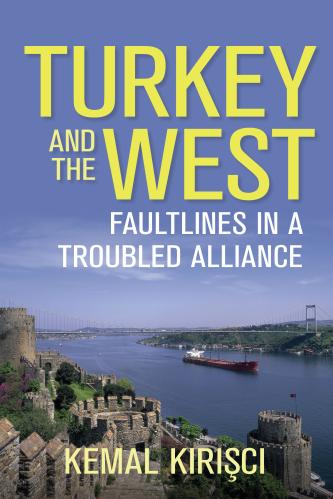
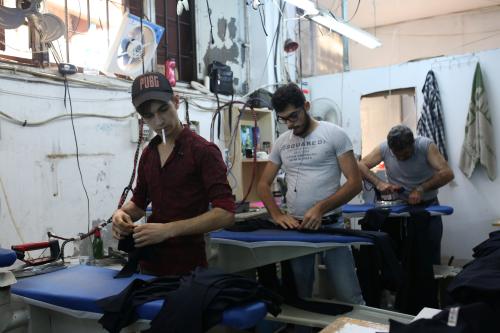
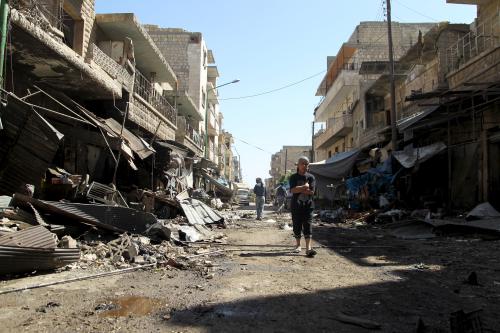
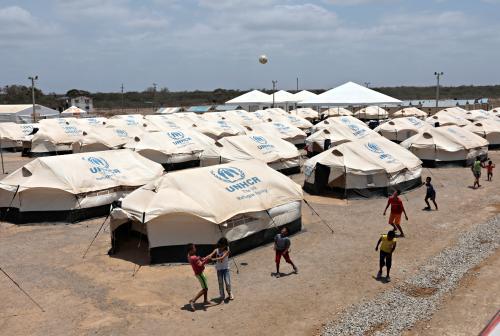

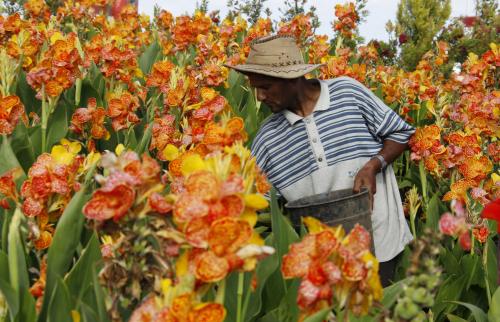
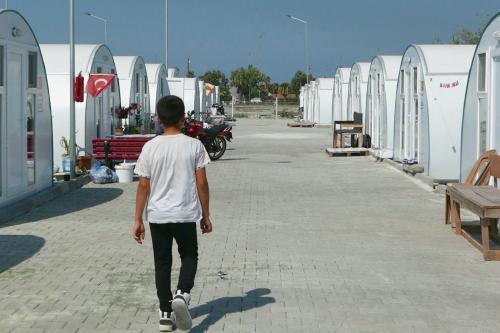
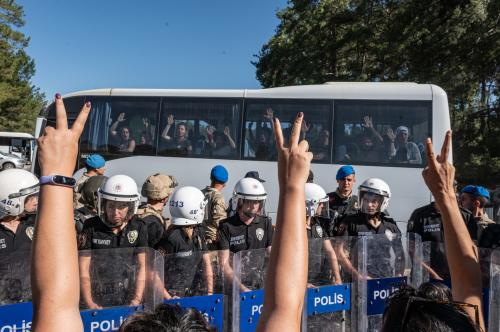
Commentary
Syrian refugees in Turkey need jobs
Why employing them is more realistic than trying to send them back
September 11, 2019